A little boy dashes down the street. He is stark naked. He pays no attention to the approaching car. He is focused on the small green fruit in his hand that he is hungrily chomping on. Two older children join him. As the car slows alongside them, they look curiously at its occupants. This close, it is clear that the small boy is eating an unripe soursop.
Adults are on the veranda of the house where the car finally stops and when an enquiry is made about the children’s mother, they quickly said she had “gone up the road.” Just behind this house is the frame of an unfinished building with no windows and only sand for the flooring. Inside there is evidence that it is being dwelled in, but its abject squalor is shocking.
More shocking is the sight of two infants sleeping in what is barely recognizable as a child’s playpen. Its grimy condition as well as that of everything inside, including the beddings and a few toys, is revolting.
Then one of the two small bodies, dressed in a dingy, urine-soaked jersey improvised as a diaper, turns, two bright eyes look up and a smile appears on the tiny face as the baby makes a small cooing sound. The smile and coo may have not been for this reporter but for the woman standing just behind (her mother). But it brought tears as it contrasted with the filth in which the infant and her twin sister slept.
This was how the Sunday Stabroek met the children of an obviously struggling mother of seven, who seemed to have lost the capability of adequately caring for her children, including the 11-month-old twin sisters.

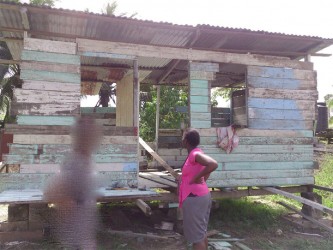
Four of the children are school-aged but were not in school. The woman said this was because her reputed husband had not been paid for the week’s work he had done. It was already past lunchtime, but there was no evidence of any food and she admitted: “All the rice done this morning, but when me mother cook she guh give them food.” As she said this, the naked two-year-old, who was still trying to make a meal of the hard soursop, begged for food.
A look around the dwelling also revealed a soiled mattress on an equally soiled bed frame, remnants of a dirty sponge mattress, a bedraggled looking suitcase and a shopping bag which contained the family’s clothing, a hammock, an empty cabinet, two dirty pots, a few bottles, two kerosene stoves and two dirty feeding bottles. Some dingy clothing hung on lines inside and outside the enclosure.
It was obvious that the woman and her partner were unable to manage and even though the woman’s extended family members were a stone’s throw away in the front house, she was still not managing. Her mother claimed that they have been assisting the woman and the children, “but she don’t hear.” Her two eldest, aged 15 and 12 years old, live with their grandmother in the front house. Aside from the twins and her partner, the woman shares the window-less dwelling with a seven-year-old, a four-year-old and the two-year-old.
By now, the babies were crying and she instructed her 12-year-old son to make them tea. When urged by this newspaper to make the tea herself, she poured tap water from a dirty bottle into the feeding bottles and added some sugar. The children drank hungrily.
It was at this point that a decision was made to call in officials from the Child Care & Protection Agency (CCPA), who immediately visited the location. They are now looking at what would be the best option for the children, who have since been removed from the unfinished house and are staying with their grandmother and other relatives, the officials said. CCPA officers are to have a family conference with all relatives to discuss the children’s welfare.
Drinking problem
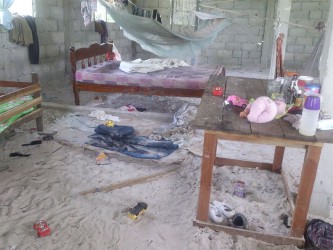
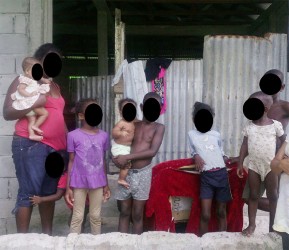
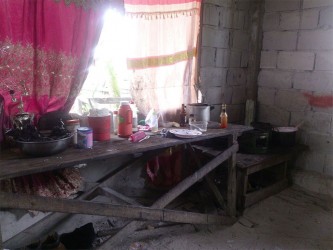
Sunday Stabroek was first alerted to the plight of this family by a concerned professional, who had seen the mother and one of her children. After questioning the woman and based on the fact that she reeked of alcohol early in the morning, the professional became concerned and along with two colleagues visited the home. She was appalled at the conditions under which the children lived and after offering initial assistance and even attempting to secure a house for the family she realized that the family needed an intervention that she was unable to provide.
Although she would not admit it, the root of the woman’s problem is that both she and her partner, who is the father of her last 3 children, have serious alcohol abuse problems.
She is known for leaving the children on their own at night for long hours and while her relatives said they help out it was clear that the children were suffering tremendously.
“I just go and take a lil drink with me friends sometimes and when last I do dah?” she goes on the defensive when the question of alcohol abuse is put to her. “When I out in night, is the house me and he does be building. We does wuk late in de night. People in this place don’t like see you deh good. Dem like talk. Dem want you beg dem and then dem cuss you.”
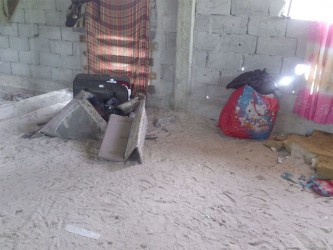
The unfinished building—not much more than a sand box—belongs to an older brother, who on her request allows her to use it as her home. She has been there since June last year, after she decided to leave her mother’s home where she had sought temporary shelter when the house she and her partner were living in fell down.
“But we building we house,” she said. “Is just some more board and lil nail it need and it finish. We guh move in another two days’ time.”
But this was what she had said when she was first visited in December last year. And while she took this newspaper to where the house is being built, it was obvious that even if the building were completed it would not improve the life of the family. Apart from the fact that the wood being used to build the house is old (some of it is rotted); there is no running water and the tiny shack could not accommodate her large family.
Her relatives, who live close by are either unable or unwilling to help the woman and her children, beyond taking the two eldest ones.
The grandmother does not want the children to be placed in state care and even the mother said, “Me children is the love of me life. I guh make it.”
“They looking good now, you shoulda see them back in October,” the grandmother said when concerns were raised about the twins who have a terrible skin rash and look sick.
The relatives confirm that the woman has a drinking problem and that “she doesn’t hear and when you talk to she; she does cuss you up.”
Seven children
At 36, the woman said she is contemplating “teking stop” but did not accept an offer to be taken to the hospital to have her tubes tied. “A guh think about it,” was how she responded.
Her seven children have four different fathers.
She claimed that she was on contraceptives when she met her last partner but was forced to discontinue after she “start haemorrhaging.” At present, she claims to be “on tablets” but when asked for evidence of this she said “it finish yesterday.”
She is not comfortable talking about her life, but said she is the ninth of 11 children for her mother and her father died when she was a child. She once had a dream of becoming a paediatrician but instead started working at the age of 16, and for a while life was “okay” until she had her first son; the product of a visiting relationship.
A few years later, she started a common-law relationship with a man for whom she bore two more children, but who shied away from his responsibilities. Even though she worked, it was hard to cope. Things took a turn for the worse when he sold the house and land where they lived and she was forced to return to her mother’s home. She remained there for a while and during that time bore her fourth child for a man with whom she shared a visiting relationship.
She then met her current partner with whom she lived until their house fell down, which eventually resulted in them living in her brother’s unfinished house.
Since she does not accept that she has a drinking problem it is not clear at what point she turned to alcohol for solace, but she does express the hope that her children will gain an education.
At one point she was laid off from her first job and was later employed as a sweeper/cleaner at a school, but left that job as sometimes she had to wait “three months to get pay.”
She may have been struggling for so long that she sees nothing wrong with the conditions under which her children exist. For her, “Once I get a lil rice, I does cook. And when I wash lil clothes fuh people I does get like a $1,200 and I does buy milk fuh dem baby.”
The CCPA has said repeatedly that it is never the agency’s intention to take children away from their parents. Its Director Ann Greene, in a past interview, had said that the agency always tries to work with the parents—mostly the mothers—to help them get their lives together while the children are in temporary state care. This intervention may include helping her to find a job and even a home and once she has proven that she can take care of her children they would be returned. Sometimes the children are not kept in state care but are placed with relatives.
In this case, the woman’s drinking problem first needs to be addressed if an intervention is to succeed.










